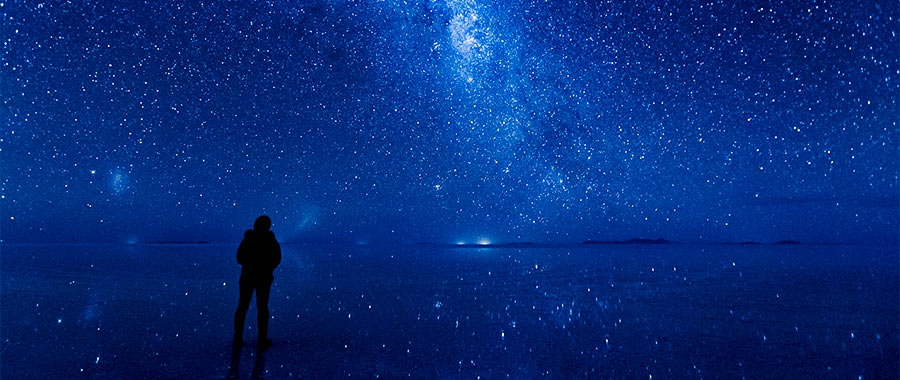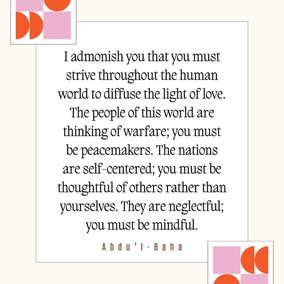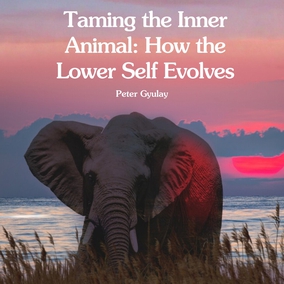The views expressed in our content reflect individual perspectives and do not represent the authoritative views of the Baha'i Faith.
Most versions of the Big Bang theory hypothesize a single point of beginning, whereas the Baha’i writings affirm repeatedly that material reality has no point of beginning.
The Baha’i teachings say our vast universe has existed eternally in the past, regardless of how infinitely it has evolved or changed in form and relationship among its constituent members. One obvious reason given for this assertion by Abdu’l-Baha is that existence cannot come from absolute non-existence:
If it be said that a certain thing was brought forth from non-existence, the intent is not absolute non-existence; rather, it is meant that the former condition was non-existence in relation to the present one. For absolute non-existence cannot become existence, as it lacks the capacity to exist. – Abdu’l-Baha, Some Answered Questions, newly revised edition, p. 324.
We encounter another problem with the age of the universe. Some scientists have concluded that the universe began roughly ten billion years ago. However, certain stars have been calculated to be at least sixteen billion years old. Clearly something is amiss.
But a more mundane question also arises: If there was a “Big Bang,” what precipitated it? If it was something physical, then something physical preceded that point in time. If it was metaphysical, then we suddenly introduce into science the existence of metaphysical reality and, even more disturbing to some scientists, a causal interplay between the two realities. What is more, if we allow that such a causal relationship occurred once, then could it not occur twice, or constantly, or infinitely?
But there are other problems. If the big bang occurred, where did it occur? If we presume that the explosion went outward, then should there not be some point in space from which it proceeded and which is static, in contradiction to Einstein’s theory of there being no static inertial frame of reference?
According to Ferris, space itself was created and grew or stretched with this first event, but in what environment did it stretch? If space is something capable of “stretching,” than it could not possibly be a void, and if it is not a void, then have we not re-created the ether, or even something more ephemeral? Furthermore, could there have been another “bang” which preceded this one, in which matter collapsed back on itself until it reached a point of critical mass and then exploded and expanded?
In other words, could we be witnessing Big Bang Number Twenty-Seven? If so, then the universe could still be infinite in time. As such, if viewed from a timeless reality or with a time-lapse lens, the universe would appear as something akin to a vast heart pulsing in the matrix of … in the matrix of what?
If the universe is infinite in space as well as in time, then the expansion we witness could be merely that assemblage of galaxies we can presently view, some larger system–which for the sake of expediency we could call a “glump.” Perhaps elsewhere in the universe are other glumps that are receding instead of expanding, preparing to coalesce and explode and expand again, thereby creating the beginning of time and space relative to that system. If so, then could there possibly be an infinite number of glumps, so that to the ear of God the universe might sound like a celebration, with fireworks exploding one after the other as glump after glump comes into being.
Possibly the big bang theory has had its fifteen minutes of fame since Stephen Hawking published his Brief History of Time in 1988. But we now have the “cold big bang theory” to explain how all this particulate matter that expanded in the first second or so formed into solar systems and galaxies. We have the “inflationary theory” to explain how an expanding universe creates space (instead of having space already there into which matter can expand). We have “superstring theory” which adds a complex of other dimensions to Einstein’s meager four dimensions.
What is more, the long-abandoned ether theory may have re-emerged, only this time around, it is not a sea of matter per se, but a sea of energy:
This plenum is, however, no longer to be conceived through the idea of a simple material medium, such as an ether, which would be regarded as existing and moving only in three-dimensional space. Rather, one is to begin with the holomovement, in which there is the immense ‘sea’ of energy. – David Bohm, Wholeness and the Implicate Order, p. 192.
Thus, whether we are referring to CMB (cosmic microwave background radiation) or other expressions of existence, it is clear that we need not worry when Abdu’l-Baha refers to a theory that most scientist have viewed as an archaic remnant from the now dated “classical” physics of the Newtonian model of the universe. Instead, we may take comfort in accepting, at least theoretically, the possibility that Abdu’l-Baha is quite correct when he asserts that there is no such thing in material creation as a lack of materiality–an absolute void.
Nature, as Aristotle famously said, abhors a vacuum.
Of course, the idea of a finite universe or “closed system” has never been universally accepted. To presume that the universe is limited to what we can presently observe would be totally arbitrary and needless, as well as the grossest sort of hubris. The Baha’i writings affirm that such is not the case—that the solar systems are infinite:
Just as particulars are infinite in number, so also the vast universals and the great realities of the universe are without number and beyond computation. The Dawning Places of Unity, the Daysprings of Singleness and the Suns of Holiness are also sanctified beyond the bounds of number, and the luminous spiritual worlds are exalted above limits and restrictions. In like manner the worlds of bodily existence the mind of no man can reckon nor the understanding of the learned comprehend. Consider the following well-known tradition and examine its meanings indicative of the vastness of the cosmos and its awesome limitless expanse: ’God, exalted be He, fashioned one hundred thousand, thousand lamps and suspended the Throne, the earth, the heavens and whatsoever is between them, even Heaven and Hell – all of these in a single lamp. And only God knows what is in the rest of the lamps.’ The fact that philosophers and sages have posited limits and restrictions for such matters is to be explained by the limitations of people’s minds and perceptions and the blindness of the followers of allusions, whose natures and intellects have been rendered dull and inanimate by the interposition of many veils. – Abdu’l-Baha, The Tablet of the Universe, anonymous provisional translation, p. 3.
You May Also Like
Comments

















If nothing comes from nothing, how is that everything came from "utter nothingness"?
"Any religious belief which is not conformable with scientific proof and investigation is superstition..."
So why do we need to argue against current scientific consensus from a religious perspective? Perhaps the issue is our interpretation of scripture. A problem I see with many of the critiques here is that some assumptions are not correct. The Big Bang wasn't really an explosion, time is not the same for ...everyone, and space doesn't need a container to expand into.